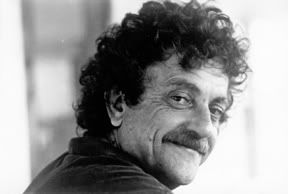Kurt Vonnegut, 1922-2007
"The worst thing that could possibly happen to anybody would be to not be used for anything by anybody. Thank you for using me, even though I didn't want to be used by anybody." - "The Sirens of Titan," Kurt Vonnegut.
 Some news you never want to hear. Kurt Vonnegut was one of the finest writers of the past century, one of my 10 favorite authors, easily, and his passing hurts.
Some news you never want to hear. Kurt Vonnegut was one of the finest writers of the past century, one of my 10 favorite authors, easily, and his passing hurts.He lived to be 84. We shared the same birthday – November 11 – so in my silly little way I felt that gave us a secret kinship, like we were members of the same club or something. The first book of his I read was 1990's "Hocus Pocus," which had the effect discovering only a truly great author can have on you – it kind of blew my mind. Even though I don't guess it's considered one of Vonnegut's top books, the tale of a veteran who becomes a teacher at a prison opened my eyes. It was kind of like watching a really great stand-up comedian riff – Vonnegut launched off onto tangents, spat out one-liners, and made you stop in shock at what he was saying – but he tied it all together in the end. It was virtuoso to read, and a style unlike any I'd ever seen.
I've consumed pretty much every other book and essay Vonnegut's written in the years since, and enjoyed most of them. He was a man who was constantly amazed by how awful life could be but yet never quite gave up on the possibility of hope. He battled depression, suicide (his mother) and war (the firebombing of Dresden). He was endlessly imaginative – the concepts that appear in some of his novels make most science fiction seem mundane and bland – and endlessly quotable. He was the iconoclast made humorous, the pundit with real wit, the depressed man who never stopped dreaming.
If you haven't read one of his books, you're missing out on one of the utterly unique voices America had in literature. His influences are everywhere from David Foster Wallace to Haruki Murakami, but Vonnegut's style remains his own, impossible to imitate. Go start with "Slaughterhouse-Five," probably, although any of his essay collections are excellent too (and offer the most unfiltered voice of his work).
I could go on and on about why Vonnegut mattered so much, but why do that when the man's considerable body of work speaks so loud? He was Mark Twain for the nuclear age. There'll be hundreds of tributes to the man in coming days, people spinning out quotes and theories and praise, but none of them will have quite as much to say as any one of Vonnegut's tall tales of life and death and lunacy. Who will take his place now?

No comments:
Post a Comment